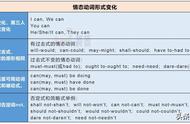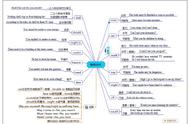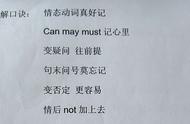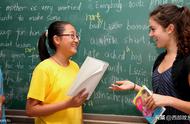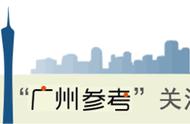
能用于表推测的情态动词:must, can, could, will,would, may, might, should, ought to
1.在肯定句中一般用must (一定),may(可能),might / could(也许,或许)。
(1)He must/may/might know the answer to this question?
他一定/可能/也许知道这个问题的答案。
(2)It is cold in the room. They must have turned off the heating.
屋里很冷,他们肯定把暖气关了。
2.否定句中用can’t / couldn’t(不可能),may not/might not(可能不)。
(1)It can’t/couldn’t be the headmaster. He has gone toAmerica.
这不可能是校长,他去美国了。
(2)He may not/might not know the scientist.
他也许不认识那位科学家。
3.疑问句中用can/could (能……?)。
(1)Could he have finished the task?
他可能把任务完成了吗?
(2)Can he be at home now?
他现在能在家吗?
注:以上三种句式中情态动词的语气按程度都是依次递减的。Might,could并非may, can的过去式,而表示语气较为委婉或可能性较小.
(二)情态动词表推测的三种时态1.对将来情况的推测,用“情态动词 动词原形”。
(1)She must / may / might / could arrive before 5.
5:00前她一定/可能/也许到。
(2)She must/may/might/could walk miles and miles among the hills without meetinganyone.
她一定/可能/也许会在山里一连走好几英里而遇不到一个人。
2.对现在或一般情况的推测,用“情态动词 be”,“情态动词 be doing”或“情态动词 动词原形”。
(1)He must / may / might / could be listening to the radio now.
他一定/可能/也许正在听收音机。
(2)He can’t ( couldn’t ) / may ( might ) not be at home at this time.
这个时候他不可能/可能不在家。
(3)Mr.Bush is on time for everything .How can ( could ) he be late for the opening ceremony ?
布什先生一向准时,这次开幕式他怎么可能迟到呢?
3.对过去情况的推测,用“情态动词 have 过去分词”。
(1)It must / may / might / could have rained last night .The ground is wet.
地湿了,昨晚肯定/可能/也许下雨了。
(2)The door was locked. He can ( could ) not / may ( might ) not have been at home .
门锁着,他不可能/可能不在家。
(3)Can/ Could he have gotten the book?
难道他找到书了吗?
注:情态动词 should /ought to表推测时,意为“想必会,理应……”但与“have 过去分词”连用时,则又可构成虚拟语气意为“本应该做某事却没做”。例如:
(4)It’s seven o’clock. Jack should/ought to be here at any moment.
现在七点钟了,杰克理应随时到达。(推测)
(5)She should / ought to have attended your birthday party, but she had to look after her mother in hospital. (虚拟)
她本该出席你的生日晚会的,可是她得在医院照顾她妈妈。
(6)Tom should not /ought not to have told me your secret, but he meant no harm. (虚拟)
汤姆本不该告诉我你的秘密,可是他并无恶意。
补充强调:推测的句型特点(对某一次的推测句型有两部分:语气和时态)
(1)语气部分:(以下情态动词语气由强至弱)
肯定句:must、may、might(=could)
否定句:can’t(=couldn’t)、mayn’t、mightn’t
疑问句:can、could(语气更加委婉不确定)
(2)时态部分:
be表示对现在的推测
have done表示对过去的推测
be doing表示对正在进行的推测
语气部分写在前时态部分写在后,组合在一起就是推测
(三)几组表推测的情态动词用法“情态动词+完成时”是考试热点,在做此类练习时,既需要掌握这一结构的基本用法,又应该仔细体会题干所提供的语言信息,准确理解语言环境和说话人的含义,尤其要注意题干中时态给予的暗示。
1、must have done
表示对已经发生的事情的推测,意为“一定,想必”, 句子中表示的是一种肯定的推测。这种结构一般只用于肯定句,其否定形式是can’t (couldn’t)have done ,表示“不可能,肯定不会”。
例如:
He didn’t hear the phone . He must have been asleep.
他没有听到电话响,他肯定是已经睡着了。
He must have been to Shanghai.
他一定去过上海。
They can’t have gone out , because the light is on .
他们不可能出去,因为灯亮着。
2、can(could)have done
表示对过去的时间内可能发生的事情的猜测,can have done 一般只用于否定句和疑问句。could have done 还可以用于肯定句,常用来表示本来可能完成而实际未完成的动作。
例如:
He can’t have finished the work so soon.
这项工作他不可能完成得这样快。
We could have walked to the station , it was so near .
我们本来是可以走到车站去的,路很近。
3、may(might)have done
(1)表示对已经发生的事情的不太肯定的推测,意为“可能已经,或许已经”。
(2)虚拟用法表示本可以做,但却没做(表示很委屈地责备)
例如:
If we had taken the other road , we might have arrived earlier.
如果我们选择另一条路,我们可能会到得早一些。
He might have given you more help, he was very busy.
他本来是可以给你更多帮助的,尽管他很忙。
4、needn’t have done
指实际上做了本来不必要做的事,意为“本来不必”。
例如:
There was plenty of time . She needn’t have hurried.
时间很充裕,她本不必匆忙。
You needn’t have told him the news.
他本来不必把这个消息告诉他。
5、should (ought to )have done
指本该做而实际未做的事,意为“本来应该”。
shouldn’t(oughtn’t)have done
表示某种行为不该发生但却发生了。
例如:
You should have started earlier , but you didn’t.
你本应该早一点出发,但是你没有。
You ought to have helped him (butyou didn’t ).你本应该帮助他。
We shouldn’t have waited for her because she never came.
我们本不应该等她,因为她根本不会来。
6、would have done 本想做(却没做)
wouldn’thave done 本不想做(却做了)
I would have helpedyou, but I was too busy.
我本想帮你,但我太忙了。
(四)表推测时,英语中只使用must,may,might,may not和can't。这五个表达的语气依次递减:
must:一定(语气肯定)
may:也许(不很肯定)
might:或许(比may语气更弱)
may not:也许不(表否定)
can't:一定不(must的反义)
推测现在的事情用must,may,might,may not和can't do或be
e.g.
She must be at home now.
The boy may play now.
推测过去的事情用must,may,might,may not和can't have done e.g.
She might have been ill yesterday.
He must have hold the party.

情态动词中的must, can, could, may, might都表推测。其中must的可能性最大,can / could次之,may / might最小。
具体用法如下:
1.must的用法
(1)表示推测“可能性”时,意思是“一定、准是”,语气较肯定,较有把握。
He must be American. = It is certain that he is American. 他准是个美国人。
(2)must表推测只能用于肯定句。如果要表示“一定不、肯定不”的意思时,应用can’t,如询问某种可能时,应用can。
He must know my address. 他肯定知道我的地址。(一定) He can’t know my address. 他肯定不知道我的地址。(一定不)
Can he know my address? 他知道我的地址吗?(询问可能性)
(3)must表示推测时,可以推测现在/正在发生的动作/过去发生的动作。
He must have a car now.
(现在)他一定有辆小汽车。
He must be doing his exercises in the classroom.
(正在进行)他一定在教室里做练习。
He must have finished the work.(过去发生)
他一定已完成了工作。
注:must表示推测时很少用于将来的情况。一般不用He must come tomorrow.可用It`s certain / I’m sure that he will come tomorrow.
(4)在反意疑问句中,当附属部分含有表示推测意义的must时,疑问部分的助动词应与must后面的动词在非推测情况下的用法保持一致。
He must be a worker, isn’t he?
(现在)他准是个工人,是吗?
It must have rained last night, didn’t it?
(过去)昨晚一定下雨了,是不是?
You must have learned English for many years, haven’t you? (完成时)你一定学了好多年英语,是吗?
2.can / could的用法
(1)can表示推测“可能性”时,往往用于否定句或疑问句。Can’t“一定不”,语气很肯定。can在疑问句中意思是“会、可能”。用于肯定句时,表示理论上的,潜在的可能性(有倾向,实际上未必会发生或者不涉及实际是否发生)往往与sometimes 或者 someone 有关。
Accidents can happen.
He can’t be at home. = It is impossible that he is at home.
他一定不在家。
(2)can /can’t后可接进行时/完成时,表示对现在发生的动作或过去发生的动作进行推测。
They can’t be reading in the library.
他们一定不在图书馆读书。
He can’t have gone to Shanghai for I saw him a minute ago. 他不可能去了上海,我刚才还看见他。
It’s so late. Where can she have gone? 天晚了,她可能去哪儿了呢?
(3)在反意疑问句中,当陈述部分含有表示推测意义的can’t时,疑问部分的助动词应与can’t后面的动词在非推测情况下的用法保持一致.
He can’t be a teacher, is he?
他不是教师,是吗?
She can’t have finished her homework, has she?
她一定没有完成家庭作业,是不是?
could可用于表示某事有可能发生表示可能性不大的推测。意思相当于may/might
Don’t eat it. It could be poisonous.
不要吃它,可能有毒。
The plane could be delayed by fog. 飞机可能会因为雾晚点。(5)could还可以用于表示客气、委婉、礼貌的请求语气。 Excuse me, could you tell me the way to the bus station? Could you help me?
(6)couldn’t表示否定推测,表示某事不可能真实,或由于特定事实或环境某事肯定不会发生。
It couldn’t possibly be poison.
这不可能是毒药。
表示对过去发生的事推测,常常和have done 连用
He was not at home last night . He could/ might have gone to movies.
I didn't see her at the meeting yesterday; she couldn't have spoken at the meeting.
3. may和might的用法
(1)may, might表示推测“可能性”时,意思是“可能”、“也许”,语气没有 must肯定。
He may / might be American. = It is possible that he is American.
他可能是个美国人。
注:might不表示过去时态,只是语气上比may更委婉,表示的可能性更小。
(2)may, might表推测时,可以用于否定句,意思是“可能不、也许不”,但不用于疑问句。
He may / might not be at home.
他也许不在家。
(3)may, might可以推测现在正在发生的动作或过去发生的动作。
He may / might be sleeping now.
(现在)他可能正在睡觉。
The boy may / might not be watching TV at home.
(现在) 这个男孩可能没在家看电视
These students may / might have seen the film before.
(过去) 这些学生以前可能看过这部电影。
(4)may, might还可以推测将来的情况。
I think we should take raincoat with us, it may rain.
我想我们应该带上雨衣,可能要下雨了。
She might not come this afternoon.
她今天下午可能不来
(六)情态动词表推测专题训练一、单项选择
1 John___ come to see us tonight, but he isn't very sure yet. A. may B. need C. can’t D. must
2 John isn’t in the classroom. He play soccer on the playground with Bob.
A. can B. must C. should D. can’t
3 That _______not be her husband . She is still single.
A. may B.can C. could D. might
4 You___ go and see a doctor at once because you got a fever.
A. can B. must C. dare D. would
5 -Can you speak Japanese? -No, I____.
A. mustn't B. can't C. needn't D. may not
6 -He___ be in the classroom, I think. -No, he ___ be in the classroom. I saw him go home a minute ago.
A.can; may not B. must; may not C. may; can't D. may; mustn't
7 -Is Lena swimming in the pool? -No, she swim. She is terrified of water.
A. may not B. must not C. can't D. needn't
8 He isn't at school. I think he ___ be ill.
A. can B. shall C. must D. might
9 -What do you think “upset” means? - I’m not sure. It mean “sad”.
A.may B. must C. can D. should
10 The children___ play football on the road.
A.can't B. can C. mustn't D. must
11.The road is wet . It ______last night.
A must rain B must have rained C could have rained D can have rained
12.He ______you more help , even though he was busy .
A might have given B might not give C may not have given D may give
答案 :ABBBB CCDAA BA

